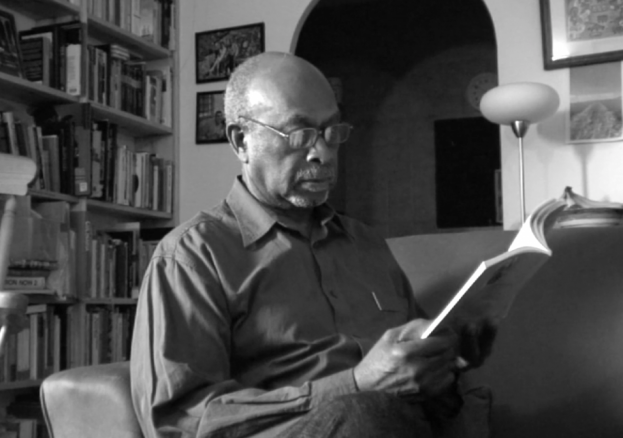
The arrival of the SS Empire Windrush in June 1948 at Tilbury Dock marked the beginning of post-war mass migration. The ship made an 8,000 mile journey from the Caribbean to London with 492 passengers on board from Jamaica, Trinidad and Tobago and other islands.
The Late, James Berry, OBE, Hon FRSL was a Jamaican poet who settled in Britain in 1948, in the first post-war wave of Jamaican emigration, later becoming one of the first Black writers in Britain to achieve wider recognition.
In his poem To Travel This Ship he recreates the journey aboard the SS Empire Windrush.
To Travel this Ship
To travel this ship, man
I gladly strip mi name
of a one-cow, two-goat an a boar pig
an sell the land piece mi father lef
to be on this ship and to be a debtor.
Man, jus fa diffrun days
I woulda sell, borrow or thief
jus fa diffrun sunrise an sundown
in annodda place wid odda ways.
To travel this ship, man
I woulda hurt, I woulda cheat or lie,
I strip mi yard, mi friend and cousin-them To get this yah ship ride.
Man – I woulda sell mi modda Jus hopin to buy her back.
Down in dat hole I was
I see this lickle luck, man,
I see this lickle light.
Man, Jamaica is a place
Where generations them start out Havin notn, earnin notn,
And – dead – leavin notn.
I did wake up every mornin and find notn change.
Children them shame to go to school barefoot.
Only a penny to buy lunch.
Man, I have follow this lickle light for change.
I a-follow it, man!
ABOUT JAMES BERRY
James Berry, OBE, Hon FRSL (28 September 1924 – 20 June 2017), was a black Jamaican poet who settled in England in the 1940s. His poetry is notable for using a mixture of standard English and Jamaican Patois. Berry’s writing often “explores the relationship between black and white communities and in particular, the excitement and tensions in the evolving relationship of the Caribbean immigrants with Britain and British society from the 1940s onwards”. As the editor of two seminal anthologies, Bluefoot Traveller (1976) and News for Babylon (1984), he was in the forefront of championing West Indian/British writing.
The son of Robert Berry, a smallholder, and his wife Maud, a seamstress, James Berry was born and grew up in rural Portland, Jamaica. He began writing stories and poems while still at school.[2] During the Second World War, as a teenager, he went to work for six years (1942–48) in the United States, before returning to Jamaica. In his own words:
“America had run into a shortage of farm labourers and was recruiting workers from Jamaica. I was 18 at the time. My friends and I, all anxious for improvement and change, were snapped up for this war work and we felt this to be a tremendous prospect for us. But we soon realised, as we had been warned, that there was a colour problem in the United States that we were not familiar with in the Caribbean. America was not a free place for black people. When I came back from America, pretty soon the same old desperation of being stuck began to affect me. When the Windrush came along, it was godsend, but I wasn’t able to get on the boat…. I had to wait for the second ship to make the journey that year, the SS Orbita.”
Settling in 1948 in Great Britain, he attended night school, trained and worked as a telegrapher in London, while also writing. He has been reported as saying: “I knew I was right for London and London was right for me. London had books and accessible libraries.”
He became an early member of the Caribbean Artists Movement, founded in 1966 by Edward Kamau Brathwaite, Andrew Salkey and John La Rose, and in 1971 was its acting chair. In 1976 Berry compiled the anthology Bluefoot Traveller and in 1979 his first poetry collection, Fractured Circles, was published by New Beacon Books. In 1981 he won the Poetry Society’s National Poetry Competition, the first poet of West Indian origin to do so. He edited the landmark anthology News for Babylon (1984), considered “a ground-breaking publication because its publishing house Chatto & Windus was ‘mainstream’ and distinguished for its international poetry list”.
Berry wrote many books for young readers, including A Thief in the Village and Other Stories (1987), The Girls and Yanga Marshall (1987), The Future-Telling Lady and Other Stories (1991), Anancy-Spiderman (1988), Don’t Leave an Elephant to Go and Chase a Bird (1996) and First Palm Trees (1997).
His last book of poetry, A Story I Am In: Selected Poems (2011), draws on five earlier collections: Fractured Circles (1979), Lucy’s Letters and Loving (1982, Chain of Days (1985), Hot Earth Cold Earth (1995) and Windrush Songs (2007).[12]
In 1995, his “Song of a Blue Foot Man” was adapted and staged at the Watford Palace Theatre.
In 1990, Berry was made an Officer of the Order of the British Empire (OBE) for services to poetry. In September 2004 he was one of fifty Black and Asian writers who have made major contributions to contemporary British literature who featured in the historic “A Great Day in London” photograph at the British Library. His archives were acquired by the British Library in October 2012. Among other items, the archive contains drafts of an unpublished novel, The Domain of Sollo and Sport.
He died in London on 20 June 2017 after suffering from Alzheimer’s disease.
